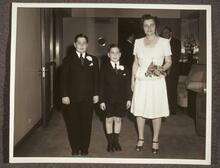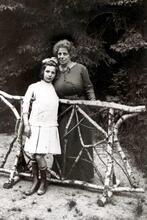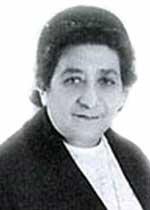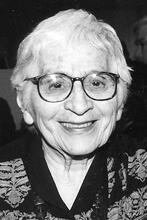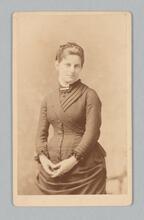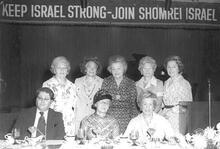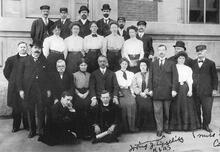Emilie M. Bullowa
Emilie M. Bullowa devoted her life to justice for disenfranchised citizens, arguing, “Our democracy doesn’t work if the people who can’t afford… legal aid can’t get justice.” Orphaned by age twenty, Bullowa postponed her law career to raise her ten younger siblings. She finally graduated from the Law College of New York University in 1900 and opened a private practice with her brother Ferdinand. Bullowa was elected president of the Women Lawyers Association of New York City in 1916 and expanded it to the national level in 1922. She also chaired various committees for the American Bar Association and served as president of the New York Medical College and Hospital for Women from 1921 until her death. Her early losses sensitized her to those in need: after World War I, she donated a chateau to French War Relief and adopted French war orphans, and during World War II she adopted several British orphans.
“Our democracy doesn’t work if the people who can’t afford to give compensation for legal aid can’t get justice.” With this declaration, lawyer Emilie M. Bullowa expressed her liberal viewpoint and charitable approach to people from all walks of life. Indeed, Bullowa put words into action, utilizing her professional and financial success for various humanitarian purposes.
Early Life and Education
She was born around 1869 to Morris and Mary (Grunhut) Bullowa of New York City. Her father, a merchant, had come to the United States from Lubenz, Czechoslovakia, around 1850. Emilie studied in New York public schools, including the Training School; she was privately taught languages, music, and art. She then attended the Normal College (later Hunter College). Both of Bullowa’s parents died before she turned twenty, and, as the eldest of eleven children—some of whom were ill and required nursing—she took charge of her brothers and sisters. In doing so, she postponed her own legal career, not entering law school until each child was established in school. This sacrifice for her family foreshadowed a lifetime of selfless devotion to those in need.
Finally, in 1900, Bullowa graduated from the Law College of New York University and was admitted to the bar. In that same year, she and her brother Ferdinand opened their own law office in New York called Bullowa and Bullowa, specializing in admiralty law. The firm dealt with the maritime legal affairs of foreign shipping lines. After Ferdinand died in 1919, Emilie continued practicing until her retirement in 1941.
Career
Bullowa earned a reputation for being a great trial lawyer. Lawyers and others admired her ability to convince judges and juries of her cases. In 1919, she established a new point in the law of libel. Her colleagues, as well as many judges, respected her attitude as a woman in a field then dominated by men: She took pride in being a lawyer, rather than in being a female lawyer.
From 1916 until 1922, Bullowa was president of the Women Lawyers Association of New York City. When she helped to take the organization to a national level in 1922, she was elected president of the now-named National Association of Women Lawyers. She became a member of the platform committee of the Women’s Democratic Union in 1924 and served as chair of various committees of the American Bar Association. She was also a member of the committee on citizenship of the New York County Lawyers Association, a position which led to her being selected as a judge in an essay contest on the United States Constitution sponsored by the New York Times. In addition, Bullowa was affiliated with the New York Medical College and Hospital for Women, first as a member of its board of directors and then, from 1921 until her death in 1942, as its president.
More than just a remarkably skillful lawyer, Bullowa was an outstanding citizen, using her talents and money to help those in need. She remarked, “It is just as important to help people in their rights as in their health and their housing.” She never turned away clients who were unable to pay. In her later years, she mainly focused on contract and surrogate cases, in order to help those who could not afford legal aid. After World War I, she inherited a chateau in France, which she gave to the French War Relief; she also adopted several French war orphans. During World War II, she donated a mobile kitchen unit to the British War Relief Society in New York and once again adopted children, this time British.
Legacy
In 1941, nearing retirement, Bullowa donated two thousand law volumes collected by her brother to the legal library of the Criminal Courts branch of the Legal Aid Society. When she retired in early 1942, she gave the British War Relief Society all of her office furniture. She also left $25,000 in her will toward the upkeep of the Legal Aid Society.
Bullowa was known as a modest, quiet person, who championed the American form of government. An enthusiastic gardener in her spare time, she especially enjoyed cultivating roses and lilies. She was religiously affiliated with the Central Synagogue in New York City.
Emilie Bullowa died on October 25, 1942, at about age seventy-three. In an era when women usually engaged in philanthropic and social activism through their husbands, and when few women were educated in the professional fields, Emilie M. Bullowa stood out as an independent and successful lawyer who used her resources for the benefit of the underprivileged.
AJYB 45: 382.
National Cyclopedia of American Biography 31 (1944).
Obituary. NYTimes, October 26, 1942, 15:3.

